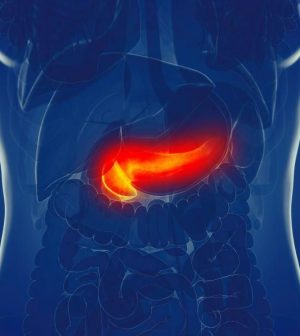- Could Your Grocery Store Meat Be Causing Recurring UTIs?
- Are You Making This Expensive Thermostat Error This Winter?
- Recognizing the Signs of Hypothyroidism
- 10 Strategies to Overcome Insomnia
- Could Artificial Sweeteners Be Aging the Brain Faster?
- Techniques for Soothing Your Nervous System
- Does the Water in Your House Smell Funny? Here’s Why
- Can a Daily Dose of Apple Cider Vinegar Actually Aid Weight Loss?
- 6 Health Beverages That Can Actually Spike Your Blood Sugar
- Treatment Options for Social Anxiety Disorder
Could Gut Microbes Affect Pancreatic Cancer Survival?

Bacteria in the gut microbiome may be the key to why some patients survive pancreatic cancer long-term, despite its notoriously low survival rate.
Only about 9% of pancreatic cancer patients survive past five years.
Looking at the microbiomes of long-term pancreatic cancer survivors, a new study found several enriched bacterial species associated with enhanced tumor immune response. The term microbiome is used for a collection of microbes, or bacteria, that live on or in the human body.
“There is emerging science suggesting that pancreas cancer survivors have a robust immune response in their tumors and data suggests the gut microbiome can influence immune response,” said co-author Dr. Jordan Kharofa, a University of Cincinnati Cancer Center physician-researcher.
“We wondered if there was a relationship with the gut microbiome in pancreatic cancer survivors,” Kharofa said in a university news release. He is also an associate professor in the UC College of Medicine’s Department of Radiation Oncology.
The researchers analyzed microbiome data from pancreatic cancer survivors and a control group of pancreatic cancer patients. The team found long-term survivors’ microbiomes had increased levels of several specific bacterial species, including Faecalibacterium prausnitzii.
“Little information exists to help us understand why some patients are cured from pancreatic cancer and unfortunately most are not,” Kharofa said. “These species may help to promote immune response to pancreas cancer but this has not yet been proven.”
The species have previously been associated with improved response to immunotherapy for patients with advanced melanoma, the most severe form of skin cancer, the authors noted.
“There is a growing understanding that the microbiome is a part of the normal immune response. The importance of the microbiome in response to immunotherapy drugs in melanoma and other cancer types is well-established,” Kharofa said.
“For the first time, we are seeing that similar species are enriched in patients cured from pancreas cancer,” he said. “We’re excited to explore this further and to evaluate if modulating the microbiome can be a therapeutic avenue in these patients.”
These bacterial species have not been linked to any specific diet, lifestyle or genetic makeup that would give insight on how to naturally elevate their levels in the microbiome, Kharofa said.
Study findings were published recently in the journal Cancer.
More information
The U.S. National Institutes of Health has more on the microbiome.
SOURCE: University of Cincinnati, news release, April 3, 2023
Source: HealthDay
Copyright © 2026 HealthDay. All rights reserved.










